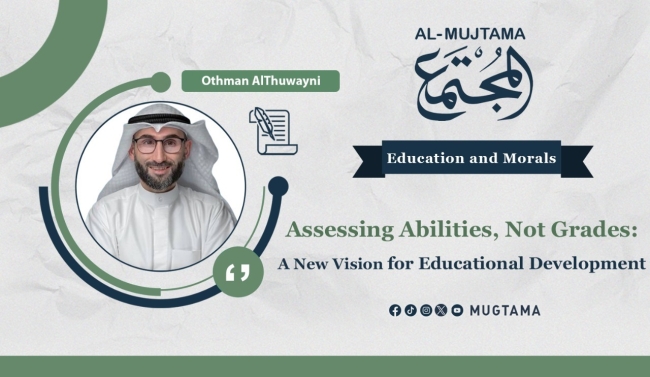Assessing Abilities, Not Grades: A New Vision for Educational Development
The educational process is not merely a means to measure students' academic abilities; rather, it is a comprehensive system aimed at refining minds, fostering values, and directing energies toward creativity. However, the academic evaluation system in most educational institutions remains confined to the framework of traditional exams, which primarily assess students' ability to memorize and recite. While this system is straightforward for evaluation and comparison, it neglects many essential aspects that shape students' personalities and actual capabilities, depriving the educational process of its diversity and depth.
Traditional exams rely on objective results and ease of implementation and analysis, making them a primary tool in most educational institutions. Nevertheless, the drawbacks of this system cannot be overlooked. It condenses a year-long educational effort into a few hours of testing, increasing psychological pressure on students. This approach sidelines creativity and overlooks practical and social skills, which are fundamental to success in real life. Despite its organization and objectivity, the traditional system falls short of offering a comprehensive picture of students' abilities and diverse talents.
Rethinking the development of the academic evaluation system requires a vision that transcends the narrow concept of assessment as merely a means of measuring academic achievement. More comprehensive evaluation tools can be introduced, such as research projects that reflect students' critical thinking and practical application of knowledge. Portfolios documenting a student’s progress throughout the year can also serve as a genuine reflection of their capabilities. Additionally, observing daily performance inside and outside the classroom can provide a more realistic and holistic assessment.
The introduction of new tools also highlights the need to involve multiple stakeholders in the evaluation process. Families can be significant partners by offering insights into the child's development outside the school framework. The local community can contribute to evaluating students' practical and social skills through collaborative projects or field activities. Involving these parties adds a humanistic and social dimension to the educational system, strengthening its role in nurturing generations capable of tackling life’s challenges.
Global experiences point to successful models that have adopted innovative evaluation systems surpassing traditional exams. In Finland, the focus is on continuous assessment, taking a holistic view of individual student progress without the pressures of standardized exams. The Montessori system emphasizes individualized learning, allowing students to learn at their own pace while focusing on practical and social skills. In Japan, extracurricular activities like arts and sports are integrated into the evaluation system, achieving a balance between academic and life-oriented aspects.
The role of academic evaluation is not limited to measuring academic achievement but extends to preparing students for the job market and practical life. Therefore, assessments should reflect the skills required in the modern era, such as creative thinking, teamwork, and problem-solving. This can be achieved by incorporating applied projects and practical training into evaluation tools, transforming the educational system into an environment that fosters creativity and prepares students for real-world demands.
Developing academic evaluation systems opens new horizons for a more inclusive and human-centered educational environment. By diversifying assessment tools, greater fairness among students can be achieved, psychological pressure can be reduced, and students’ self-confidence can be enhanced. Such development would grant schools a renewed role, not limited to transferring knowledge but also encompassing support for talents, fostering human values, and nurturing creative thinking.
There is a pressing need to reshape the academic evaluation system to align more closely with the comprehensive goals of education and better represent the diversity of human capabilities. While traditional exams are essential, they are only one part of a broader picture. Through collaboration among schools, families, and communities, an integrated educational model can be built, reflecting the essence of education as a process for building individuals in all their dimensions.
-------------------------------------------------------------


